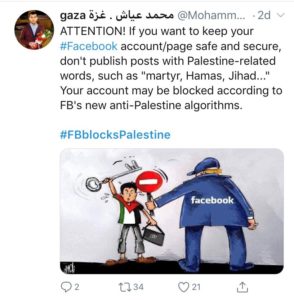Journalists, activists launch campaign against alleged violations of user freedoms by social media platform
A Palestinian social media campaign rejecting what it calls “violations” of Facebook rules by censoring Palestinian content has been launched by Palestinian journalists and activists in cooperation with Sada Social Center, which monitors social media violations against Palestinian content.
The campaign is calling on users to tweet using the hashtag #FBblockspalestine by Wednesday night at 8 p.m. to highlight “the threat posed by Facebook against Palestinian content, and to make it public, as well as reveal the double-standard policy of Facebook management in dealing with Israeli and Palestinian incitement on its site.”
“Twitter is the first in a series of actions we will take,” Eyad Rifai, head of Sada Social Center, told The Media Line. “Next week, we will meet with a group of institutions and potential partners to discuss ways to jointly counter the attack on Palestinian content. At a second stage, we will hold field protests as well.”

Rifai said the campaign aims to “protect the digital rights of the Palestinian people so they can practice their right of absolute freedom of speech via cyberspace, although without the involvement of Facebook management that limits their freedoms while allowing Israeli users to incite against Arabs as well as call to kill them.”
He continued by saying that “Facebook has developed an algorithm that automatically deletes users’ posts and accounts if they include names of Palestinian political parties, for example ‘Hamas,’ ‘Jihad,’ ‘Popular Front,’ ‘Qassam,’ ‘Saraya’ and ‘Islamic Jihad,’ or names of martyrs, leaders and others without looking at the context in which they were posted, which sets a historic precedent for infringement on media freedom.”
Rifai pointed out that Palestinian journalists and media people are “unable to practice their journalistic work as a result of Facebook’s unfair policy, which doesn’t pay attention to professional work standards. This puts the Palestinian narrative on Facebook in real danger.”
He said the campaign had sent a letter to the Middle East management of Facebook to condemn the policy, adding that he “isn’t very optimistic” to receive a positive response.
“We will receive the same justification, which isn’t new anymore, that Facebook is an American company committed to renouncing terrorism as part of an agreement with the American government. The algorithm is simply unfair and doesn’t take into account the specificity of the Palestinian cause,” Rifai said.
Dahoud Abu Dalfeh, a Gaza-based journalist who said his Facebook account had been deleted in September for “using content that is against Facebook policy,” told The Media Line that “Facebook management sees using Palestinian symbols, names or political parties as incitement to violence, regardless of the nature of the work of the publisher.”
He insists he was not trying to provoke anyone.
“I was just doing my job when I lost my account,” he explained.
“Even when we cover news regarding Lebanon, we can’t use terms concerning Hizbullah or [Hizbullah leader Hassan] Nasrallah,” he went on. “A lot of times we are not allowed to object or report the deletion of an account. When we try, we receive a message that an unknown error has occurred, which creates another issue.”
Abu Dalfeh said Facebook management “does not handle the escalating Israeli incitement against Palestinians the same way or use similar algorithms, which makes it biased toward Israel.”
In August, the Sada Center documented more than 17 violations against Palestinian content on social media, most of them on Facebook, “which created a need for the center and other activists to actively protest Facebook managerial procedures rather than just continue to just monitor its violations.”
Ali Bikhat, a Palestinian social media analyst and head of the Social Media Club at The Palestinian Institute for Communication and Development, claimed to The Media Line that “there has been coordination between Israeli authorities and the management of Facebook. On the Palestinian side, there isn’t any diplomatic effort to reach agreement with site management to reduce its policy or end it.”
For this reason, he advocates for a more proactive approach.
“We must communicate with Facebook management in regard to these terms in order to change the policy and highlight its manipulation in dealing with Israeli incitement over Palestinian content,” Bikhat said.
The goal of the campaign should be “ending Facebook’s policy against Palestinians accounts,” he added.
“Facebook policy eliminates the Palestinian existence and narrative on its site, which supports and serves the Israeli narrative,” he insisted. “Even if the campaign doesn’t end the policy, at least it highlights the case widely and raises awareness.”